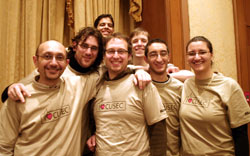Concordia software conference grows

The student-founded CUSEC conference has just finished its fifth consecutive year. Pictured from left to right are organizers Ashraf Gaffar, Mark Pavlidis, Neeraj Mathrani, John Kopanas, Michel Parisien, Ahmed Kamel and Nadia Chaouch.
Photo by jason gondziola
What began as a near-failure five years ago has mushroomed into a thriving annual event.
The Canadian University Software Engineering Confer-ence (CUSEC) finished its fifth successful run at the Omni Hotel last weekend. Sponsored by Concordia, McMaster University and software companies Microsoft, Electronic Arts and gameloft, the theme of this year’s event was Engineering Useful Software.
The conference has its roots in Concordia’s upstart software engineering program, which at the time of its inception had only 17 students.
“I was part of the first ever class of software engineering,” recalls software engineering student and conference co-founder John Kopanas. “I was the head delegate for another conference, and I really didn’t enjoy it. I knew we could do a much better job.”
So he and other students from the program decided to start their own academic conference. It nearly flopped. Five days before the inaugural event they had only four delegates registered. The team set to work doing class presentations and finding companies to subsidize tickets. By the start of the conference, they had 100 delegates.
This year’s crowd was even larger, according to Nadia Chaouch, the fourth-year Software Engineering student in charge of the conference website and registration.
“It’s been going up throughout the years, from 100 in the first year to 225, just counting the students,” she says. “We had very good keynotes, but also compared to previous years we had more corporate presenters. That helps a lot because people are interested in them. People want to see things that they don’t learn in school.”
While he acknowledges that corporate presentations are an enticement for fellow students, Kopanas says that CUSEC sets itself apart from other conferences in that it leaves little space for companies to come in and toot their own horns.
“They’re allowed to give presentations, but their marketing people cannot,” he explains. “Students don’t want to be sold. They want to hear from the trenches. It has to be software engineers from within the company who can offer something.”
Peter Grogono, Professor and Associate Chair in Computer Science, serves as the conference’s advisor. He delivered this year’s keynote on modular concurrency, a new, highly abstracted programming paradigm.
He says he is constantly impressed by the quality of speakers that the conference attracts. This year’s conference included presentations from technology giants Autodesk, Motorola, SAP and IBM.
“These are the top people who are well-known throughout the industry,” he says. “They come talk to us and the students love it. Apart from giving the talk, they hang around and spend time with the students and answer questions.”
This year’s conference also featured David Heinemeier Hans-son, the 2005 Google and O’Reilly’s Open Source Best Hacker Award Recipient and founder of the Ruby on Rails web development framework.
“He’s probably the closest thing to a rock star in the internet world,” Kopanas says. “He created a framework that has totally changed the way people develop websites.”
The conference has been such a success that organizers have spun it out of the student body and into the hands of the Software Engineering Advance-ment Initiative (SOEN AI), an organization founded by Kopanas. It will take over conference planning and focus on other means of boosting Canada’s software engineering community.
Future events will include podcasts, user groups and summer camps for coders. The organization also hopes to one day take this conference on the road and make it a truly national event.
